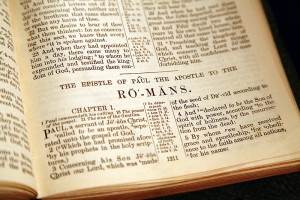In this video on the book of Romans, we discuss Paul’s view of the gospel, the Torah (the law of Moses) and the reunification of the nation of Israel.The material presented here is totally fresh and is from a Hebraic perspective and is likely totally different than anything you’ve heard on this subject to this point. For a free, short study guide to this video, go to http://hoshanarabbah.org/blog/2014/05/28/the-book-of-romans/.
Tag Archives: Torah
The Book of Romans: The Gospel, the Torah & the Israelite Nation Reunited
The Main Themes of Romans
The is perhaps the only book in the Bible that is organized systematically like a theological textbook from beginning to end with each point leading to the next. This is not how biblical books are typically arranged.

In this letter, there are several main themes.
Pre-eminently, Elohim is the Just Judge of the universe to whom all are accountable (both Jews and Gentiles). This concept alone is huge, since most humans don’t want to believe they’re accountable to anyone except their own egos.
The Torah is Elohim’s standard of righteousness by which he will judge the deeds of all men (both Jews and Gentiles) fairly. If people can accept the fact that there is a supreme God to whom they’re accountable for their actions, then it’s a short next logical step to accept that such a God has laws that man must follow if he’s not to run afoul of that God.
Next, Paul counters a religious system that purported to explain who that God was and what he required of sinful man. This was Judaism. The problem is that Judaism had perverted the truth of Elohim into a racially exclusive, legalistic, works-based salvational system. Paul attempts to correct this error, and restore this religion to its original truth.
Paul then presents the gospel message of salvation by grace through faith in Yeshua the Messiah is at the center of YHVH’s process to redeem sinful man.
Before Elohim, the God of the universe, there is no racial inequality between Jews and Gentiles. Elohim isn’t a racist. All are equal before him. All are sinners, and all need Yeshua.
Paul’s Epistle to the Romans keeps Yeshua and the gospel message front and center, yet at the same time Paul weaves together the good news of Yeshua with that of the righteous lifestyle of Torah-obedience. Together, these two messages form a beautiful tapestry-like picture encompassing the message of the entire Bible from Genesis to Revelation — a message of the salvation of man resulting in his being reconciled to Elohim his becoming elevated to the spiritual status as a child of Elohim.
Part 1 — Introduction: The Cornerstone of the Gospel Message
At the very beginning of his epistle, Paul carefully and boldly sets in place the cornerstone for what is to follow. He declares the preeminence of the gospel message and his Continue reading
How the Church Divorced Itself From Its Jewish Roots
From A.D. 70 to A.D. 135—How the Church Became Divorced From Its Hebraic Roots
What is called Christianity today in many ways is very dissimilar, and in many respects, outright antagonistic to the religion of the first-century, Book of Acts believers. How did this come to be?
Many modern Christian churches prides themselves on being “a New Testament church,” yet what they practice and believe is often very different from and even opposed to the teaching and practices of the apostles and primitive, first century church. For example, life for the apostolic believers in Jerusalem revolved around the temple (Acts 2:46; 3:1; 5:19-21; 5:42; Acts 21:26; 22:17; 24:18; 25:8; 26:21), and for those outside of the land of Israel, on most Sabbaths, they attended the local synagogue (Acts 13:14; 14:1; 17:1–2; 18:4, 7, 8, 19, 26; 19:8). Not only did the first apostles and early believers not celebrate any pagan influenced holidays such as Easter, Christmas, Halloween, Lent, and the rest, but they adhered to the Torah or law of Moses (see references below). The Book of Acts record is also clear that early believers kept the Bible festivals (as outlined in Lev 23; Acts 2:1; 18:21; Acts 27:9; 1 Cor 5:8; Jude 12) of Passover, Unleavened Bread, Pentecost, Day of Trumpets, Day of Atonement, Feast of Tabernacles, and the Eighth Day.
What’s more, the book of Acts records that both Stephen and Paul were falsely accused of teaching that the laws and customs of Moses were nullified, and, as a result of this false accusation, both lost their lives defending Torah-obedience.
A hundred other examples could easily be given showing how the Christian church has veered away from the Hebrew or Jewish roots of its faith, but hopefully, the reader gets the point.
So what happened to cause Christianity to veer so widely from the Hebrew or Jewish roots of its faith and to arrive at the place where it hardly resembles that religious faith from which it sprang? This is not an easy question to answer since one must look back nearly 2000 years and attempt to reconstruct the times in which our spiritual forefathers lived. Moreover, we must understand what was transpiring politically, religiously, and socially at the time to answer this question properly. It is also imperative that we understand the contextual social and linguistic fabric, the backdrop of history, and the parade of political and economic events which happened one after another between the years of A.D. 70 and A.D. 135. Then and only then can we understand how the church became divorced from its Hebraic roots and became Greco-Roman and Western in nature and combined itself with an admixture of with pagan and antibiblical doctrines along with pagan practices, traditions and beliefs.
Now, let us go back nearly 2000 years for a short lesson in history. The early church was Continue reading
Overview of the Book of Numbers (B’midbar
The English name Numbers derives from the fact that in this book the Israelites are counted or numbered on several occasions (see chapters 1, 2, 3, 4, 26). Leviticus ends with YHVH instructing his people to count their flocks for tithe purposes, while Numbers begins with YHVH, as the ultimate Good Shepherd (or in Hebrews, YHVH Rohee), counting the Israelites themselves, who are the sheep of his pasture (Pss 74:1; 79:13; 95:7; 100:3). The fact that this counting took place in the wilderness proves that it was not for political or national economic reasons, but was in fulfillment of YHVH’s Torah instructions. Each Israelite was to give a half-shekel of silver toward the maintenance of the tabernacle. The shekels then counted would give the exact number of Israelites (Exod 30:12–16).
The Hebrew name B’midbar meaning “in the wilderness” originates from the fact that this book chronicles Israel’s wandering in the wilderness. The Book of Exodus, on the other hand, records the deliverance of Israel from Egypt, its establishment as a nation, its covenantal relationship with YHVH and the construction of the tabernacle (mishkan), which was the symbol of YHVH dwelling or tabernacling in the midst of his chosen people. The Book of Leviticus deals with the inner workings of that tabernacle and the mechanics of how sinful man could maintain a right spiritual relationship with a righteous Elohim. This was accomplished through the agency of the Levitical priesthood that would function within the tabernacle as a human intermediary between man and his Creator.
Do you know how to add? If so, you’re on the road to perfection.
2 Peter 1:5–7, Add to your faith. This list of seven character qualities shows us the progressive steps one must go through to become mature spiritually.
Faith: First there is initial faith in YHVH Elohim, which is the starting point in our spiritual walk. This is the same faith Abraham had when YHVH told him to leave Babylonia, and it was accounted to him for righteousness sake (Gen 15:6; Rom 4:3).
Virtue: Next, initial faith in Elohim is “filled out with” (as J. P. Green translates it) virtue, which is defined as “moral excellence.” This is can be no less than one’s learning to conform our lives to the high standards of the Torah, which tells us how to walk in relationship with Elohim (as summarized by the first four of the ten commandments) and our fellow man (as summarized by the last six of the ten commandments). Virtue is the opposite of sin, and the Torah shows us what sin and moral excellence are by showing us what to do (the path of blessing and life) and what not to do (the path of curses and death).
Knowledge: Second, as one begins to walk out Torah-obedience, one gains a deeper and more perfect understanding of the heart, will and mind of Elohim as expressed in the Creator’s instruction manual for living — the Torah, which is the path that leads to life. At the same time, one gains an understanding of the opposite side, which is that of sin that leads to death.
Self-control: Third, as one gains a fuller understanding of the difference between good and evil, right and wrong as defined by YHVH’s instructions in righteousness, the Torah, and as one fortifies oneself morally by choosing consistently to do the right thing, one gains self-control. One learns to control or master one’s fleshly passions and desires including selfishness, pride, greed, anger and lust and all the other works of the flesh (Gal 5:19–21).
Perseverance or patience: Fourth, as one becomes proficient and consistent in self-control, one begins to learn patience or perseverance, which is steadfastness, constancy and endurance. At this stage in one’s spiritual development, one becomes less likely to be buffeted or thrown off balance by one’s own carnal impulses or by those of other people that are directed at us (persecution).
Godliness: Fifth, as our life more consistently begins to reflect the heart, mind and will of YHVH Elohim as exemplified in his Torah and as walked out by Yeshua, the Living Torah-Word, then our words, thoughts and actions will begin to reflect the very character and nature of our Father in heaven, which is godliness, to those around us, even as the moon reflects the light of the sun into the darkness of the night world. At this point, who we are is more defined by the character of Elohim than by the carnal, sin nature of the typical man.
Brotherly kindness: Sixth, obedience to the Torah naturally results in our being kinder and gentler to those around us, since the Torah demands that we treat others how we want to be treated (Matt 7:12; Rom 13:8–10).
Love: The seventh step to spiritual maturity is love, which is the summation of all the fruit of the Spirit (Gal 5:22–24) and is the highest level of spiritual attainment (1 Cor 13:1–13). This type of love is unconditional, and is an unselfish love for others even when there is no personal benefit to be gained. This is the love of Elohim — the love that he has for men, and the love that he wants us to develop, so that we will be like him, so that he can live with us forever in his eternal kingdom. After we have matured through these seven steps, we become spiritually and morally complete or perfect and are ready to spend eternity with YHVH Elohim in the New Jerusalem of heaven on earth.
The Promise of Power from Above
John 14:16, Comforter.
The Spirit of Elohim Energizes our Spirit to Keep the Torah
At the end of his ministry, Yeshua promised his disciples to send them his Holy Spirit or Comforter after he had left earth (John 14:16). He declares that his Holy Spirit would dwell in them (John 14:17), would testify of him (John 15:26), would convict the world of sin (or Torahlessess, John 16:8), would guide them into all truth (i.e., Torah, see Ps 119:142,151), would tell them things to come (John 16:13), and would glorify the Son and speak to them on behalf of the Son (John 16:14).
How, therefore, does the Spirit of Elohim interact with man? Man is a three-part being: body, soul and spirit (1 Thess 5:23). The body is the physical part of man, the soul is the personality or beingness of man (his mind, will and emotions), and his spirit is the part of man that points him God-ward, and that, once spiritually regenerated and enlightened by the Spirit of Elohim, connects us to Elohim. Man must come to the Father by way of his spirit (John 4:23–24). The Father reveals his spiritual mysteries to man by his Holy Spirit to the spiritually regenerated spirit in man (2 Cor 2:6–16).
There are numerous scriptures that attest to the fact that at the time of our spiritual rebirth (a.k.a. conversion, regeneration, redemption or salvation), YHVH activates our spirit with his Spirit, thus allowing us to enter into a spiritual relationship or communion with him. This is important to know, since man can’t properly obey Elohim out of his soul (the mind, the will and the emotions) alone without the leading of his spirit. Taken to the next step, Continue reading
New Video: From A.D. 70 to 135 — How the Early Church Left Its Hebrew Roots
This video is a history lesson discussing the events that happened affecting the early church between A.D. 70 (when the Romans destroyed the Jerusalem temple) and A.D. 135. During this time, the early church largely cut itself off from its pro-Torah, Jewish/Hebrew roots. By the middle of the fourth century, the new Roman Catholic Church hardly resembled its apostolic original. This video helps you to understand why the modern church has beliefs that are very different from, and, at times, opposed theologically to the original apostolic church of the first century.
)




